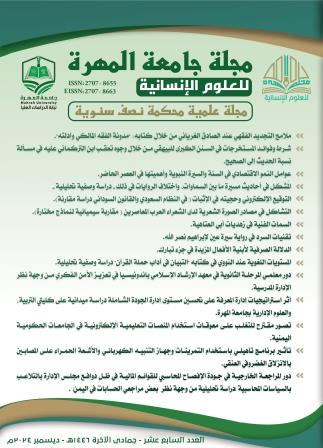The Roles of External Audit in the Quality of Accounting Disclosure of Financial Statement under the Board of Directors Motivation to Manipulate Accounting Policies
دراسة تحليلية من وجهة نظر بعض مراجعي الحسابات في اليمن
DOI:
https://doi.org/10.71311/.v5i2.167Keywords:
external audit, quality of accounting disclosure, board of directors, motivation to manipulate accounting policies, yemenAbstract
This study aims to measure the roles of the relationship between external audit on the quality of accounting disclosure under the board of directors motivation to manipulate accounting policies and to achieve the search objective a sample of accounting and audited offices, and several statistically statistical methods such as central middle geometries, normative ancient deviation, simple linear decline, and testing of study hypotheses have been used SPSS. The research has reached many of the most important results, there is a significant impact on external audit control on the quality of disclosure Accounting in the financial statements, as well as a significant impact of a statistically significant impact on management motivations to manipulate accounting policies. The research has reached several recommendations, the most important of which the Office of the Accounts must review its relationship with existing customers Continually enhance the quality of accounting disclosure, as well as the Office of Accounts, as well as an assessment of a possible customer before accepting the audit task to ensure the quality of accounting disclosure, and professional organizations for accounting work should not affect the nature of economic climate The prevailing social community, which stimulates the administration to pave income through manipulation and misleading accounting information related to income, reflected on the quality of disclosure.
Downloads

Downloads
Published
How to Cite
Issue
Section
License
Copyright and Licensing
copyright is retained by the authors. Articles are licensed under an open access Creative Commons CC BY 4.0 license, meaning that anyone may download and read the paper for free. In addition, the article may be reused and quoted provided that the original published version is cited. These conditions allow for maximum use and exposure of the work.

